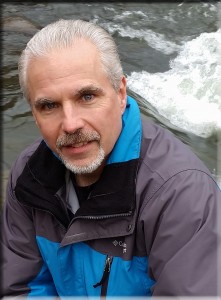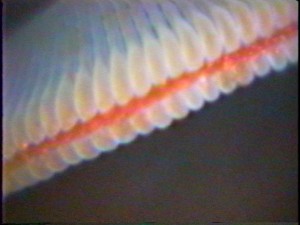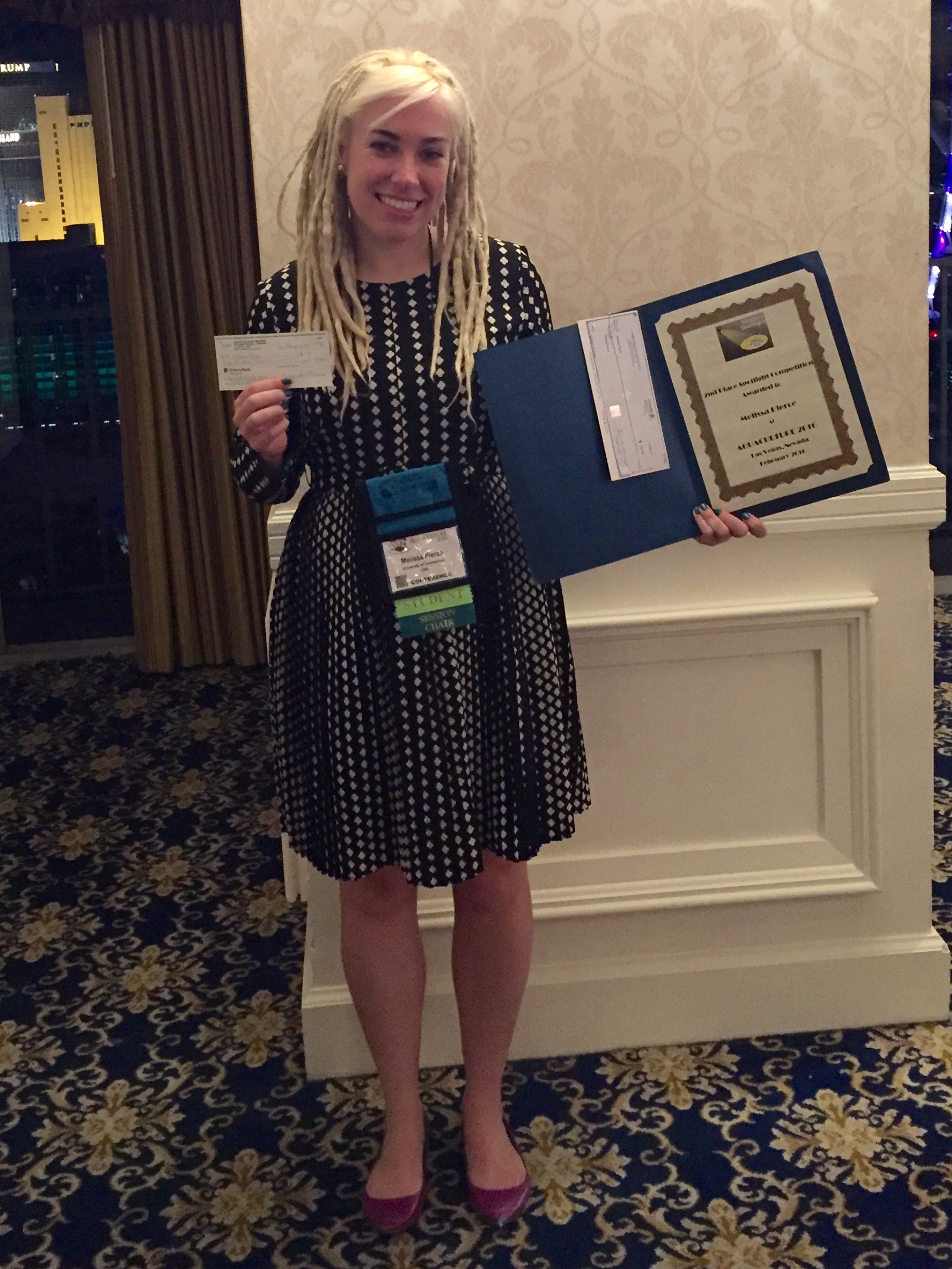Dr. Dierssen, professor in Marine Sciences, is participating in a new NASA-funded project to conduct airborne mapping of coral reef ecology as part of the COral Reef Airborne Laboratory (CORAL). Her team will collect field data to validate the remote sensing observations collected in Hawaii, the Mariana Islands, Palau, and the Great Barrier Reef. For each reef, the spectral imagery will be processed to assess the distribution of coral and rates of coral primary productivity and calcification. A recent Nature article describes the project: http://www.nature.com/news/marine-ecologists-take-to-the-skies-to-study-coral-reefs-1.20004
Author: Schuler, Debra
Melissa Pierce received the Thurlow C. Nelson Award for Outstanding Student Oral Presentation
Doctoral candidate Melissa Pierce received the Thurlow C. Nelson Award for Outstanding Student Oral Presentation from the National Shellfisheries Association. Melissa received the award for her talk entitled “Bivalves maintain a core gut microbiome: seasonal trends and species variation,” at the Aquaculture 2016 meeting. The Thurlow C. Nelson Award is given for an outstanding oral presentation of research that represents a distinctive and valuable contribution to shellfisheries science. The Award is named after the distinguished shellfish biologist who served as NSA President from 1931-1933 and contributed more than 125 papers, many relating to oyster biology.
20th Anniversary of Feng Graduate Research Colloquium
The 11th Biennial Feng Graduate Research Colloquium on May 12, 2016, is also the 20th anniversary of this event, which showcases and celebrates the research projects of graduate students in the Department of Marine Sciences.
The all-day event will feature talks and posters. Download the program and presentation abstracts below.
Short Program
Long Program (includes abstracts)
Graduating doctoral students Melissa Pierce and Maria Rosa hired for post-doctoral positions
Congratulations to Melissa Pierce for being hired as a post-doctoral research associate at The University of Illinois at Chicago. Melissa will be working in the laboratory of Dr. Rachel Poretsky on a NOAA-funded project. The project is aimed at improving aquaculture conditions for sablefish by evaluating the influence of the microbial community, DMSP, and potential algal/bacterial interactions on larval growth and behavior. Sablefish (also known as black cod) are a species of interest to the aquaculture community in part because of their high omega-3 fatty acid content.
Congratulations to Maria Rosa on her recently awarded NSF Post-doctoral Fellowship in Biology! Maria will be conducting her post-doc at Stony Brook University with sponsoring scientist Dr. Dianna K. Padilla. The goal of the study is to determine the relative importance of different feeding modes during early ontogenetic stages of representative species of suspension-feeding molluscs.
Monahan to Receive Distinguished Service Award from CASE
Rocky Hill, CT – The Connecticut Academy of Science and Engineering (CASE) will present a CASE award for Distinguished Service to its member Edward C. Monahan for his outstanding leadership within the Academy, specifically for significant contributions through his 12 years of service as the CASE Bulletin Executive Editor for Science. The CASE Governing Council created the Distinguished Service Award in 2010 to honor members who have provided outstanding service to the Academy. CASE will present the award at its 41st Annual Meeting and Dinner on Tuesday, May 24th at the University of New Haven.
Monahan was elected to CASE in 1999 and has served as Executive Editor for Science of the quarterly CASE Bulletin from 2004 to 2016. He is the longest serving Executive Editor in the history of the publication, having exceeded the previous record of 10 years. He retires from this role effective this spring. During his service, he provided expert scientific and technical advice, assisted in the selection of the feature articles, and reviewed each issue for quality and to ensure that information of interest to the Bulletin readership was included and understandable to individuals with a wide range of backgrounds. In this role, Professor Monahan also regularly participated in quarterly meetings of the Academy’s Governing Council. He has also served as a study committee member on the CASE – Long Island Sound Symposium: A Study of Benthic Habitats (2004).
Ed received a PhD from MIT, a DSc from the National University of Ireland, and is a Fellow of both the American Meteorological Society and the Acoustical Society of America. His research activities continue to center on investigations of those physical processes involved in air-sea exchange. He has greatly enhanced the understanding of the role of bubbles in mediating the air-sea exchange of sea-salt, moisture, heat, and gases, and while doing so has pointed out the significance of these air-sea interactions in the maintenance of the climate on earth.
For 20 years, he was the Director of the Connecticut Sea Grant Program at the University of Connecticut, Avery Point, and in retirement, currently serves as the Chairman of the Southeastern Connecticut Water Authority.
###
The Connecticut Academy of Science and Engineering was chartered by the General Assembly in 1976 to provide expert guidance on science and technology to the people and to the state of Connecticut, and to promote the application of science and technology to human welfare and economic well being. For more information about the Academy, visit www.ctcase.org.
Marine Sciences student Ronald Tardiff outstanding CLAS student 2016
Marine Sciences student Ronald Tardiff was featured by CLAS as one of their outstanding students graduating in 2016.
Professor Evan Ward’s research video highlighted in TV program about microplastics
Professor Evan Ward of Marine Sciences has been studying how microparticles, including plastics, are captured and ingested by bivalve molluscs (mussels, oysters, clams) for over 20 years. Recently, one of his research videos of the process, recorded inside living bivalves by means of endoscopy, was highlighted in an Australian TV story about microplastics in the marine environment. The story was produced by Australia’s leading science TV program, Catalyst, and aired on ABC in that country. It can also be viewed world-wide on the Catalyst web site, the link to which can be found here: http://www.abc.net.au/catalyst/stories/4424996.htm
Doctoral Student Brittany Sprecher selected for a Graduate Research Fellowship from the National Science Foundation
Doctoral Student Brittany Sprecher is among a select group of researchers from across the United States being awarded a prestigious Graduate Research Fellowship from the National Science Foundation.
The primary goal of Brittany Sprecher’s research in biological oceanography is to look at phytate as a growth substrate for dinoflagellates. Dinoflagellates are an important class of primary producers. Key findings will provide a novel perspective on phosphorous utilization in dinoflagellates. If phytate utilization is found, phytate could be used as a molecular marker for future studies to survey the phytate-utilizing ability in global phytoplankton communities.
Assistant Professor Julie Granger is one of four CLAS professors to earn an NSF CAREER award
Assistant Professor of Marine Sciences Julie Granger has been awarded $791,496 over five years for her project, “The biological nitrogen isotope systematics of ammonium consumption and production.”
Granger’s work seeks to create a basis through which researchers can better understand the oceanic nitrogen cycle. Isotopic data can be useful to interpreting nitrogen cycle processes in the ocean that are difficult to measure directly. Granger’s research will investigate the processes behind isotope fractionation, or relative abundance, of ammonium during biological processes. It will investigate whether low concentrations of ammonium in the surface ocean affect isotope fractionation when the ammonium is recycled, and whether there is a trophic isotope effect associated with ammonium recycling by plankton.
The research will create a baseline from which researchers can interpret recycled nitrogen dynamics from ammonium isotope datasets, and will significantly enhance our ability to understand the ocean’s fundamental chemistry and its vulnerability to human impacts.
Granger also plans to integrate science with community-engaged learning by developing an undergraduate field and laboratory course requiring students to present their research to stakeholders in the community. A manual created for this course will be disseminated in open-access forums for teachers to develop similar courses.
Melissa Pierce received two awards at the international Aquaculture 2016 meeting
Doctoral candidate Melissa Pierce received a second place award in the Student Spotlight Competition (5 slides, 3.5 minutes) at the international Aquaculture 2016 meeting. She also received the Johnnie Castro Montealegre Award from the FUCOBI Foundation. The FUCOBI foundation is an international collaboration of researchers and NGO focused on “ONE HEALTH” – a program aimed at conserving healthy ecosystems to maintain biodiversity and healthy animals to protect human health.


